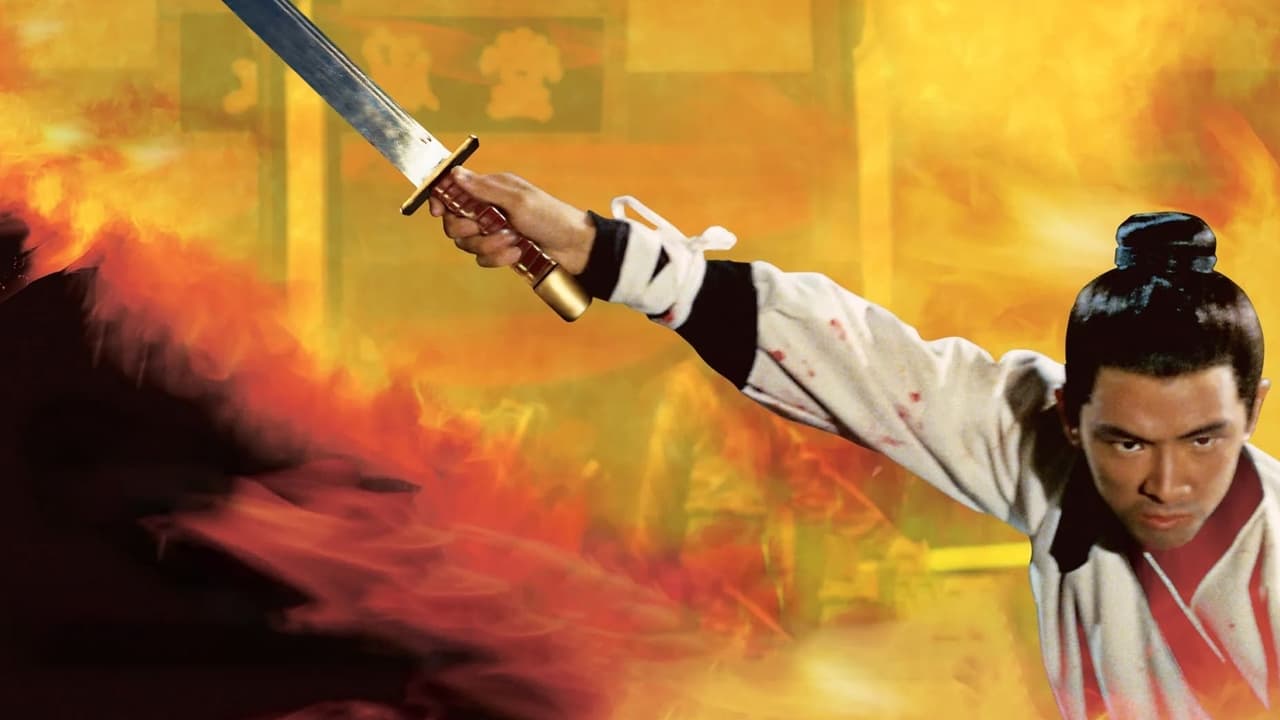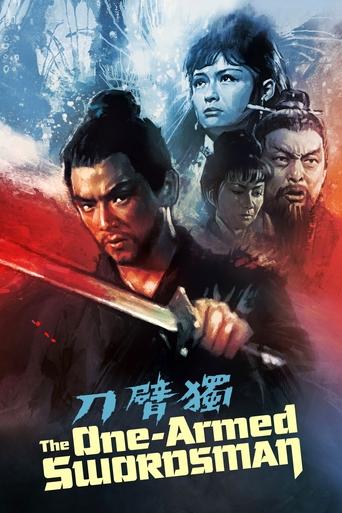

A lower caste servant gives his life in defense of his master, Qi, master of the Golden Sword school. Qi promises the dying man that he will raise his son; the boy retrieves his father's broken sword (which will prove pivotal later), and grows up to be Wang Yu. Belittled for being the son of a mere servant, the adult Yu decides to leave the school- but Qi's daughter, whose advances Yu has rebuffed, takes it upon herself to amputate his right arm in retribution. This impromptu surgery takes place in a snow-bound forest and is foreshadowed by the chopping off of a tree limb. It's a remarkably bloodless affair, and Yu staggers away to throw himself off a bridge- but he falls, instead, on the (conveniently) passing boat of Miss Xiaoman, who nurses him back to health. Meanwhile, Smiling Tiger (whose smile is deceptive) and Long-armed Devil (whose whip and short spears are "extensions" of his reach, one presumes) have decided to hunt down and kill all of Qi's Golden Sword students. The bad guys have developed a "sword-lock" weapon that, coupled with the use of a dagger, makes them night unbeatable. Yu, meanwhile, gets "better," though he's remarkably proficient with his left hand for a man used to fighting with his right. (He even develops Chi to the point where he can push air (?) hard enough to trim limbs from a tree and leave his palm-print in a tree stump. These two incidents happen back-to-back and both involve tree LIMBS and a tree STUMP. One can only wonder if the symbolism was intentional by director Chang Cheh. My guess would be that it WAS.) All of the foregoing leads to a final confrontation at the Golden Sword school that should not be missed.
... View MoreGiven the bad reputation of Chinese martial arts films in general, plus the undeniable fact that many of these - including this one - use genre conventions originally developed for the popular stage (what has been called "Chinese Opera" is actually more analogous to American Vaudeville), it is only with considerable effort that an admirer if these films can persuade Americans to watch these movies, let alone appreciate them fully. But the point really is, that the directors of these films use what they have to portray the culture in which they live in a manner as completely cinematic as can be found in any national film tradition.All this is a warm up to this: The One-Armed Swordsman is as masterful a film as Kurosawa Akira's Yojimbo.I make this specific comparison because each film was made within a genre to which the film contributes genre-shattering innovation, while at the same time maintaining certain essential conventions that keep it safely within the genre. Thus Kurosawa's renegade ronin is a tough, cynical, manipulator of the various villains of the film, in a way even the most tragic hero of the Japanese samurai film (chambara) of the time could never be; nonetheless, he still manages to kill everyone at the end, much like all the other chambara heroes.Similarly, Chang Cheh's One-Armed hero follows genre convention by performing super-human feats of skill (like leaving the imprint of his hand on a rock with a single blow), but just as a character, he is completely new.The typical wu xia film of the time generally had an aristocratic hero; if he had no personal problems to deal with, he always wore white. If he had personal problems, he would drink heavily and dress like a mendicant monk. He was in utter thrall to whatever worthiest female was in his immediate vicinity; his cause was always to uphold the right, protect chastity, and further the well-being of the Chinese people as a whole. His one real defect (as a "type") was that he really liked fighting, which usually got him into trouble with those with similar enjoyments.Chang Cheh's Feng Kong (as played by Wang Yu in what is his finest role) is not an aristocrat, but an orphaned son of a servant; he doesn't wear white, he wears black; remaining loyal to her father (his former teacher) he grows to hate the young lady who chopped off his arm (I certainly would) and grows attached to the dead warrior's daughter (with whom he sleeps without marriage) only after she has nursed him back to health - but he remains determined to control his own fate nonetheless. The future of the Chinese people doesn't interest him. Eventually, he abjures fighting and goes off to become a farmer.As can be discovered from various interviews, Chang Cheh, in filming what is still his most completely realized vision, was perfectly aware that he was making such innovations. In fact, in terms of traditional Chinese culture alone, The One-Armed Swordsman comes across as a radical Confucian demand for recognition of merit above social status; and of the need for social stability over and against any desire for personal revenge.Furthermore, Chang Cheh pulls this off in a manner utterly consistent with the social trends of the 1960s - Feng Kong is portrayed as an "angry young man" - the representative of an entire generation fed up with many of the myths of the old culture to which they have been indoctrinated. He is brazen, energetic, honest, and more than a little suspicious of old prejudices (which have never favored him anyway). And having been told that he was not "born worthy", he sets out to proves that he can learn self-sufficiency without the benefit of institutional education. He doesn't need to start a revolution - he IS a revolution.Of course, if the general quality of the film as a whole were not utterly top-notch, this message would be meaningless. But the camera-work, supporting performances by the other actors, staging and direction, and most of the editing are all "world-class" - as good as anything coming out of Hollywood that decade, and better than any Hollywood film of the decade's latter half.Let the genre conventions be what they are, and pay respect to one of the best films of its type - and perhaps one of the finest films ever made, world-wide.
... View MoreThere are tonnes of wuxia stories and films out there, it's quite difficult to be established as one of the classics. One-Armed Swordsman happens to be one of the best remembered and loved stories that defined wuxia, and it is no doubt that actor Wang Yu and director Chang Cheh were made household names.Common themes in wuxia like brotherhood, romance, piety, revenge are all rolled into One-Armed Swordsman. A son of a servant who died valiantly protecting his master, Qi Rufeng of the Golden Sword Clan, Fang Gang (Want Yu) was brought up by Qi Rufeng as one of his disciples, but his daughter Qi Pei-er accidentally chops off Fang Gang's right arm in a fit of petty anger.Running away and injured, Fang Gang was saved by a village girl Hsiao Man, who nurses him back to health, and passes to him half a sacred kung fu manual, which has only the left-handed moves left (yes, it's that convenient). Swearing to leave the martial arts world and minding his own business, little does he realize that a rival clan has developed weapons and moves to counter the Golden Sword Clan, and are out for blood.Realizing that he cannot let down the master who has brought him up, Fang Gang goes to their rescue, against the wishes of Hsiao Man. Caught between two benefactors, Fang Gang has to make the decision, one in which only a true swordsman will definitely make.The martial arts, compared to today's standards might seem cheesy, but it's the good old days sans wire work. The teahouse fight remains one of the better sequences, and they all get as bloody as they can get, hence Chang Cheh was also known as the "ketchup" director. You'll marvel at how smart editing actually allows for some "slick" martial arts moves to be performed.Characters are kept simple - the good are good, and the bad are really evil, and look the part too. It's a one dimensional world, but that keeps the storyline simple as you await the action to begin.So for that introductory look into the world of Wuxia, One-Armed Swordsman might just be the vehicle for you - characters, themes, weapons, the hallmark elements of a good wuxia film are all there.This Code 3 DVD contains a behind the scenes gallery, the trailers, production notes and biographies, and a segment on 5 animated works done by various educational institutions in Asia. The winning segment comes from Singapore, and it indeed is a beauty to watch.
... View MoreI did not know then that Chinese martial art fighters were distinguished by the myriad schools where they trained. I also learned that hand-clasping (as if in prayer) greeting with a bow that a swordfighter uses to greet his shifu (teacher). How about that peculiar Chinese idiom: "Please don't stand on ceremony" meant to put guests at ease? Neat. So a Chi man has 64 ways of using his sword. Actually the Chinese call it a knife because of its shape and it is much broader than an ordinary sword. Chinese swords tend to be somewhat slim and light. The slightly built Wang Yu seems an unlikely candidate to be a super swordsman but his stance and his moves belie the frail looks. The hero underdog gives not only as good as he gets, but more! Jimmy is a double edged martial arts movie actor. Obviously he knows his martial onions although he is not truly a master like Bruce Lee. BUT, he sure can act.The female lead Chiao Chiao played other swordfighter roles quite credibly but I was disappointed that in some movies she was cast as a femme fatale even with nude scenes.
... View More